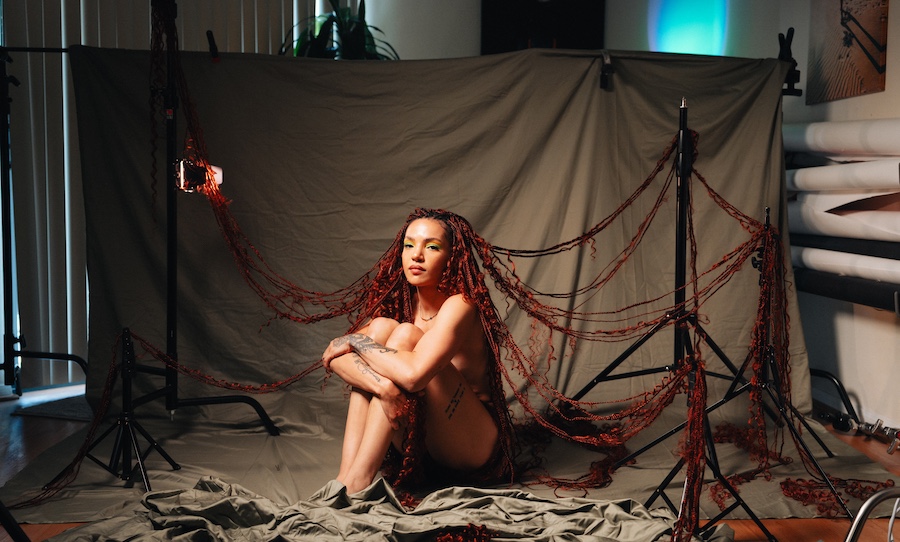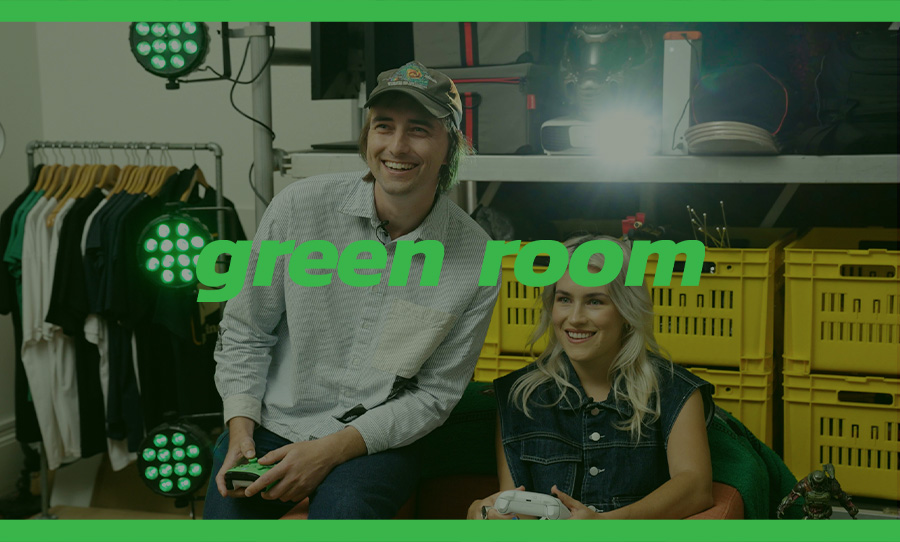Militarie Gun drops their debut album “Life Under The Gun” today, we chat to frontman Ian Shelton about a DIY approach, the significance of ownership and creative exploration.
Fronted by Ian Shelton, Militarie Gun defies easy categorization, emerging as an enigmatic sonic force.
Their debut album, “Life Under The Gun,” presents a bewildering paradox, blending fiercely abrasive pop elements with strangely infectious hardcore undertones.
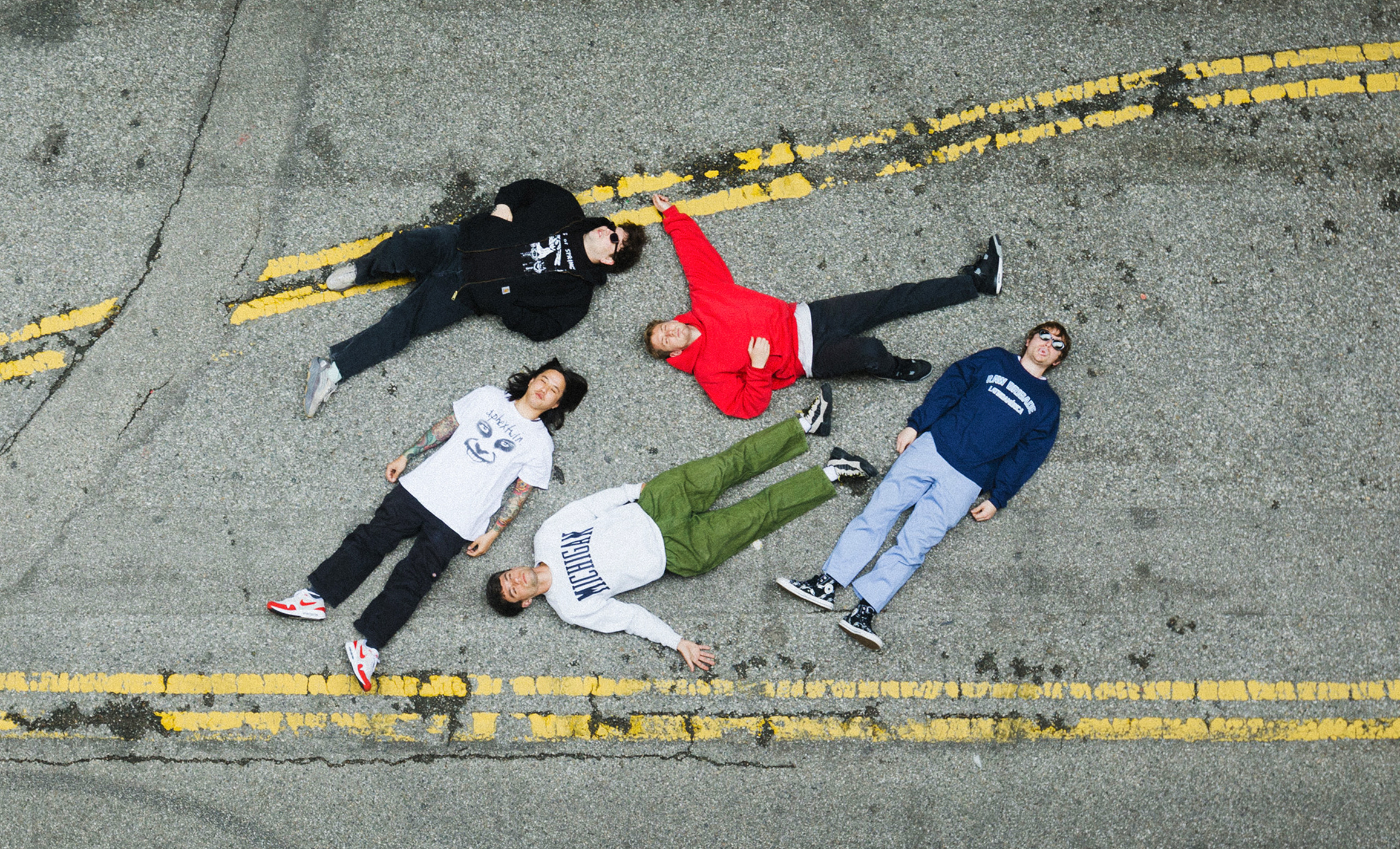
In a mere blink of an eye since their inception in 2020, Militarie Gun has unapologetically surged forward with an unyielding torrent of releases and relentless touring, ceaselessly gathering momentum as they carve an indelible niche within the alt-rock realm.
“Life Under The Gun,” their latest opus, emerges as the culmination of a tireless odyssey, intimately interwoven with frontman Ian Shelton’s poignant personal narrative.
In the grip of addiction, Shelton’s upbringing was marred by a heavy burden that tainted his household. Each day brought a tumultuous mix of euphoria and chaos, leaving him yearning for freedom. But in the midst of this turmoil, music became Shelton’s sanctuary—a transcendent pathway to emancipation, where his soul found solace and liberation.
After bidding adieu to high school, Ian Shelton found himself amidst the pulsating heartbeat of Seattle, where he birthed the ferocious hardcore entity known as Regional Justice Center.
Shelton’s innate affinity for filmmaking also blossomed concurrently, leading him to direct music videos for a myriad of esteemed artists. Yet, when the tumultuous year of 2020 cast an unexpected wrench into his plans, Shelton found himself instinctively drawn back to his immediate passion: the art of songwriting.
Shelton got busy and unleashed a stream of compositions that would eventually encapsulate the very essence of Militarie Gun. This marked a transformative departure for him, fusing elements of punk and hardcore with infectious, hook-laden qualities reminiscent of legendary acts such as Guided By Voices, Fugazi, and The Jesus Lizard.
Shelton took charge, fearlessly leading the recording process for their EP “My Life Is Over.” The band’s lineup, including Nick Cogan, William Acuña, Vince Nguyen, and Max Epstein, created their groundbreaking album “Life Under The Gun.”
On a first listen to “Life Under The Gun,” it becomes increasingly apparent that Militarie Gun – to say the least have a discerning ear, in the realm of musical exploration.
Engineered by Taylor Young at The Pit Recording Studio, the record amplifies their finest elements while retaining their raw punk essence.
Shelton joyfully acknowledges that the album fulfills his long-held vision—a band rooted in melodious resonance. Collaboration is intrinsic to Shelton’s creative process.
Whether harmonizing with bandmates or intertwining with influences like Taylor Young and James Goodson of Dazy, the yearning for artistic connection resonates in every note.
Sharing energy with others becomes a conduit for forging intimate bonds and leaving an indomitable mark on the soul.
Militarie Gun’s debut album, “Life Under The Gun,” is a testament to their growth, determination, and authentic self-expression. Frontman Ian Shelton fearlessly channels his belief in collaboration and the power of art to connect.
In our interview, Ian Shelton discussed the bands busy schedule, DIY approach, and the importance of ownership in their creative process, his admiration for Ms. Paint and his penchant for family dramas.
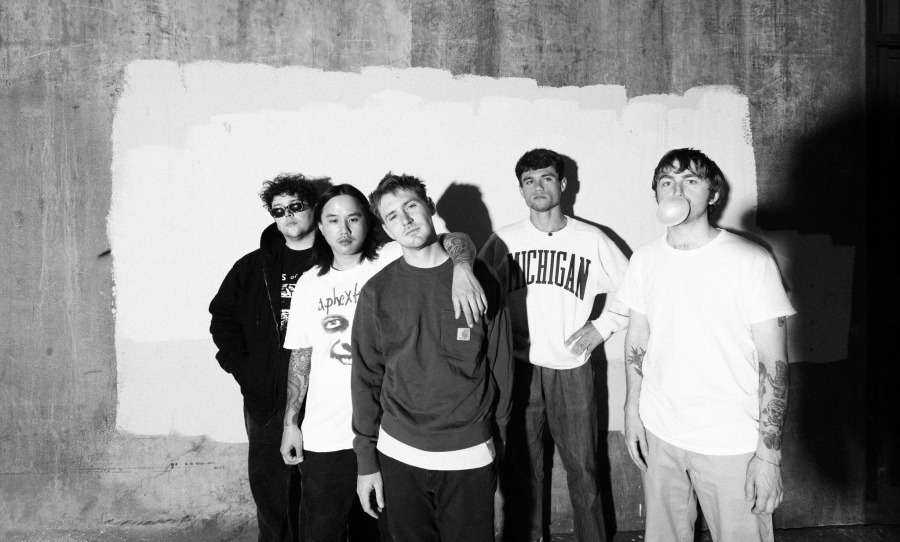
Happy: So great to be chatting to you today. How are you?
Ian: I’m doing great. Just running around like a chicken with my head cut off, picking up records. We’re about to do some record release stuff, so I’m just running around Los Angeles, driving all over.
Happy: Love LA! Congrats on the debut album. It’s really great.
Ian: Thank you so much.
Happy: So where’s home for you at the moment?
Ian: Los Angeles.
Happy: What’s the current music scene like in your neck of the woods?
Ian: I mean, it’s great. All of our friends are making really great records right now, and it’s an easy time to be a fan of music because it seems like there’s so many cool things happening.
Happy: Absolutely. What’s your average day like at the moment?
Ian: Usually lately it’s been wake up, do two or three interviews, and then try to find some time to work on some music, or we’re having to write music videos. We choose to be very DIY in our approach.
We don’t really let a lot of other people in on creating things for us, so it’s just a process of kind of having too many things to do most of the time because we self elect to do as many things as possible.
So it’s just a lot of writing ideas that then we scrap because we’re already over them, because we don’t want them to exist. So I don’t know. It’s a lot of back and forth. It’s mainly just trying to find ways to make people understand this album the best way that they can.
Happy: That’s a big part of why everybody loves you guys so much, because you really do come across as independent. I guess you’ve created a really strong sense of ownership, which is pretty cool.
Ian: Yeah. We’re all people who have been playing in DIY bands for a super long time, so we wanted to work with a label that was down to support our vision and not take the ball out of our hands, but instead try to figure out how best to aid us, and that’s luckily where we ended up.
Happy: It’s a theme that we are seeing more and more coming through. So you’ve told us about your average day, which is pretty damn busy, by the sounds of it. What about your ultimate day?
Ian: Ultimate day would be go see a movie and make a demo and play a show. If I could somehow do all three of those things in one day, that would be the ultimate day for me.
Happy: Sounds perfect. Can we ask about some of the artists or bands that have inspired you lately?
Ian: The band that inspires me the most is probably Ms. Paint. They’re a band from Mississippi. I worked on their LP with them and it’s synthesizers, bass, guitar and drums and just the coolest vocals you could imagine. And they’re just like a band that doesn’t accept any of the formal structure or they literally refuse to do what they believe every other band does.
So they’re just fun because they actually do think out of the box and they are so open and vulnerable. Like amazing, beautiful lyrics. That’s my number one Ms. Paint. If I could talk about any band, I’m going to talk about Ms. Paint.
Happy: All right. We are going to go out of our way to listen.
Ian: There’s a song that we do together, so it’d be easy to find as well.
Happy: You say a lot of things that reflect a lot of depth and personal and spiritual growth, which really comes through in your music. What kind of things do you read or watch that open your mind to new perspectives?
Ian: It’s hard to say. I mean, I feel like my media intake because by the end of the day, I’m just ready to be nonexistent. It’s gotten kind of bleak with some reality TV and things like that, but the thing that I’ve always loved over time is just I love family dramas.
I love just movies that try to scratch at something deeper. I feel like as far as I’m not a big reader, but On Tennis by David Foster Wallace, I read that and I’m currently rereading it. And it’s one of those things I feel like was a very world shaping concept and very much affects the way that I carry myself.
And I listen to this podcast called Blocks. It’s this comedian, Neil Brennan, and it’s just people literally just unpacking their traumas. It’s like basically you’re just listening to two comedians do a therapy session. And I think a huge part of growing up for me was trying to make trauma into comedy and art. And so that very much fits into the way that I see the world.
And yeah, I don’t know, I wish I was like a reader and could say that I’m reading some things that are really helping me grow, but it’s kind of, again, bleak just because we’re so busy.
I stay very hungry on the music front and trying to discover the next thing that’s going to really inspire me, but otherwise it can be as mindless as possible depending on the day?
Happy: Rereading books for us is a really big one as well, because you always get something out of it second time around that you might not have understood the first time. So we are huge fans of rereading and re watching literally everything.
Ian: I’ll rewatch a movie four times back when I used to rent movies, I would watch it two, three times at least before returning it, just because I want to get everything I can out of it and then bring it back.
Ian: The final chord in the final song rings out like it’s asking a question about change. Do you like change? How do you handle change?
Ian: I’m not a huge fan of change. I am very reluctant to. I love a rhythm, but at the same time, I think that specifically what the song is talking about is acknowledging when something doesn’t serve you anymore and is really a limiter on your happiness or growth in life.
And that whole song is just asking like, can I move on with my life? Am I willing to? Am I ready? It’s kind of meant to be all encompassing in that way, and I never try to offer a solution. It’s more so just about laying it all out there and never pretending to know the answer at the same time.
I don’t know if I have moved on from whatever the topics of these songs are. I don’t know that I’ve it’s really just meant to be a question for the sake of hopefully making yourself question whatever is you need to question.
Happy: That resonates. If there was one thing about your daily routine that you could change that would instantly make your life better, what would that be?
Ian: It would be to have more attention span, I guess. Maybe no caffeine or something, so I’m a little less crazy.
I don’t know. But I’m very all over the place and all the things in my life get done little by little because I never have the attention span to do one full thing at a time.
So if I could change anything about my days, it would just be to actually be able to sit down and focus to achieve one thing at a time instead of inching ten different things little by little each. I think my life would be vastly improved.
Happy: Okay. You should give it a stab one day.
Ian: Yeah, I think I’ll need to do Ritalin or something. I don’t know. We’ll see.
Happy: You’ve got an extensive background in filmmaking and I know that you’ve directed music videos. How is that something is visual storytelling really big for you when you create music?
Ian: I wouldn’t say in the creation of the music, but I do get to think about how the best way to represent it is. And so shortly after a song is created, I do think about its visual representation and how to communicate whatever it is that I want to within the song.
So hopefully that just ends up so that when we end up making music videos and things like that, that they have a little bit more consideration than maybe other artists. A huge part of that for this was the album art was I knew the concept that I wanted for the art before the record was recorded. And then, luckily, we found the art director at the label just made what I felt to be the perfect art that encapsulated everything I was trying to say.
And I think that because I have the filmmaking tools, I can kind of communicate into a photographic medium with somebody else a little bit easier than others might be able to.
Happy: We are curious about the recording process at The Pit recording studio. Is there anything that you can share about the recording process of the album?
Ian: So we did the drums at Dave Grohl’s studio. It’s called Studio 606. And that was a very surreal experience. I mean, it’s just such an amazing room. And then not only that, we recorded it on the board that Nevermind and Fleetwood Mac used to make all of ther amazing records. There’s a great documentary about the board that we recorded the record on.
We did the rest at Taylor Young studio, The Pit. And I feel like that was a real way of encapsulating kind of the concept of the record, of doing things that are the big rock thing, but then providing all of the personality that we have acquired through hardcore and punk and meshing it all together.
And on top of that, we had this guy, Mark Needham, who did the killers hot fuss mix the record. So we had this hardcore engineer in Taylor Young making these incredible tones, and then we hand it to somebody with this big pop background.
And the big goal was saying that we’re making somewhat of a pop hardcore record and something more akin to classic rock than a lot of other things. So it was just trying to find that correct balance that all those things fell in line.
I think that the tools, the spaces, all these things really accumulated into something that we’re all very proud of.
Happy: You nailed it. You absolutely captured it brilliantly.
Ian: Thank you. It was a year plus of conversation before we recorded it that got us there, so it was overthought. But I hope that it feels immediate still.
Happy: What are your plans for the future, both musically and personally?
Ian: Just keep writing, and that’s what we’ve been doing. We’re amassing whatever is going to be next, and I hope to have some time for some filmmaking and have some time with the band to make something more so than just a music video, just, you know, something that kind of stands on its own or is interesting that maybe other bands aren’t. And yeah, just trying to find every moment possible to take the band further.
Happy: What makes you happy?
Ian: Listening to a new song makes me happy. That’s the ultimate feeling in the world when you finish a demo and I’ll spend the rest of the day listening to it and hearing what should or shouldn’t change and what I like about it and then what I want to do next and, yeah, a day that I create a song… there’s no better day.
Happy: We really appreciate the time you took today to chat with us. Hopefully we’ll see you in Australia soon.
Ian: Hopefully soon. Thank you.
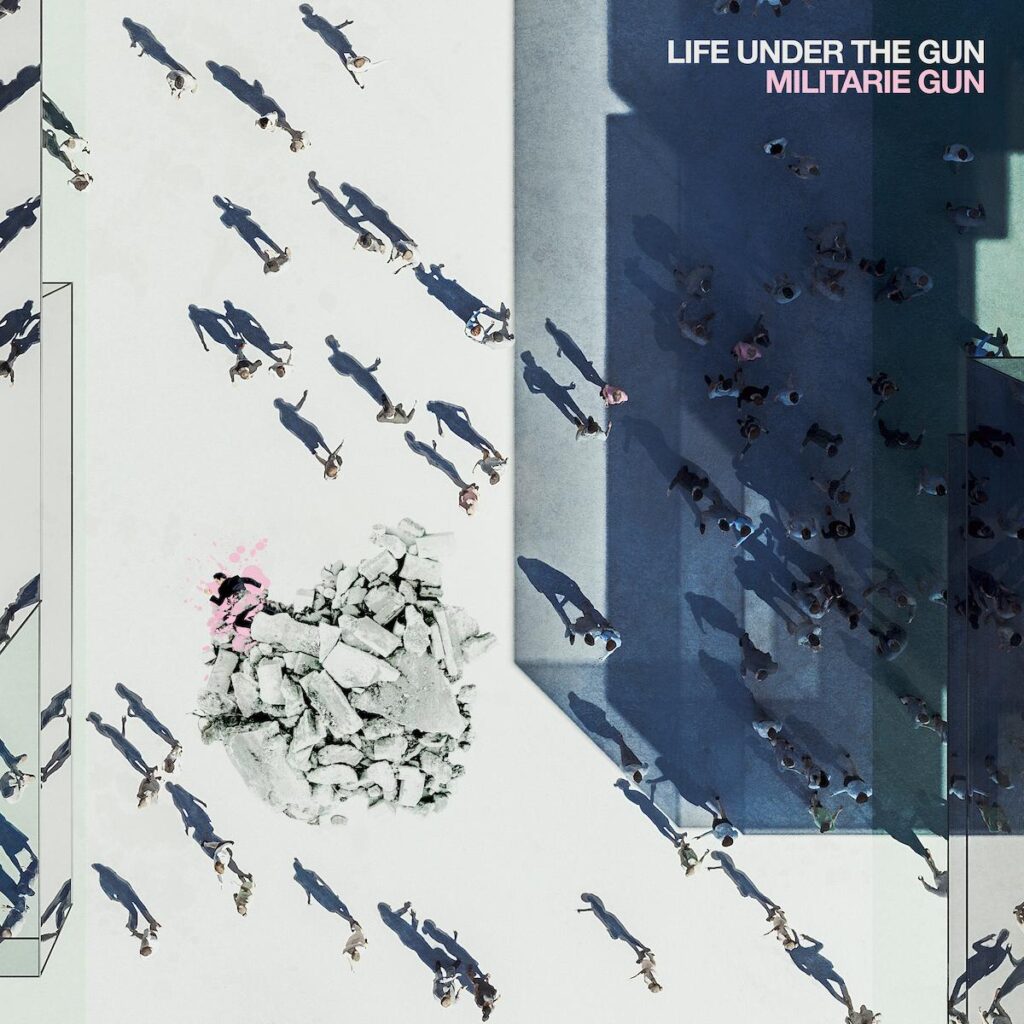
1. Do It Faster
2. Very High
3. Will Logic
4. My Friends Are Having a Hard Time
5. Think Less
6. Return Policy
7. Seizure of Assets
8. Never Fucked Up Once
9. Big Disappointment
10. Sway Too
11. See You Around
12. Life Under The Gun
Out now via Loma Vista Recordings

